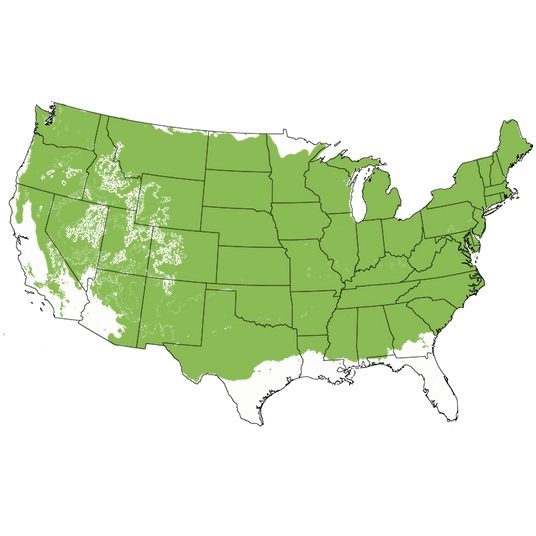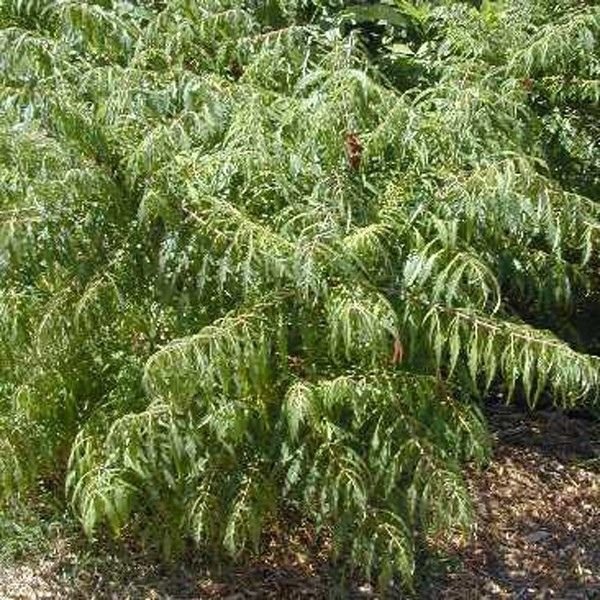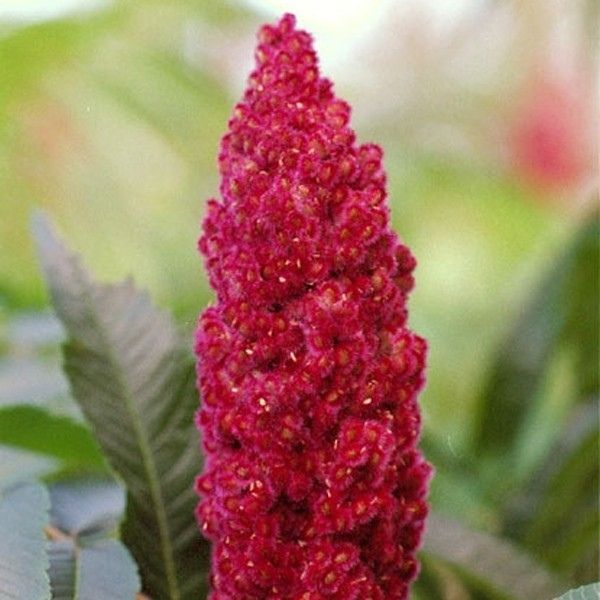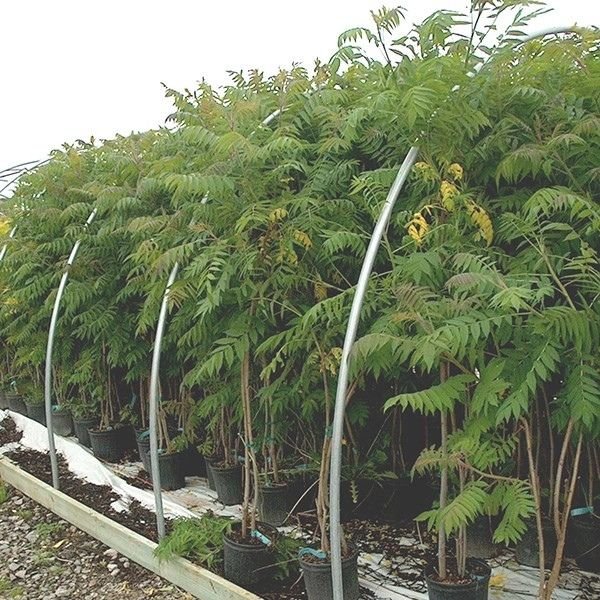Staghorn Sumac
Rhus typhina
Planting & Care
Planting & Care
Delivery and Shipping
Delivery and Shipping
Preorder Shipping Schedule
We ship your plants when it's safe to transport them to your zone. Dates are estimated and subject to weather delays.
| Zone 3-4 | Week of March 30th |
| Zone 5 | Week of March 16th |
| Zone 6 | Week of March 2nd |
| Zone 7-12 | Week of February 23rd |
Shipping Rates
Ships in 3-4 business days • Tracking provided • Weather protected
| Under $50 | $9.99 |
| $50 - $99.99 | $14.99 |
| $100 - $149.99 | $16.99 |
| $150 - $198.99 | $24.99 |
| $199+ | FREE |
✓ Zone-specific timing • ✓ Professional packaging • ✓ Health guarantee

Plant Sentry™ Protected
Your order is protected by our compliance system that:
- Prevents restricted plants from shipping to your state
- Ensures plants meet your state's agricultural requirements
- Protects gardens from invasive pests and diseases
Hardy Staghorn Sumac Incredible Fall Color
- Outstanding Fall Color
- Mature Stems Resemble Stag Horns
- Wildlife Interest
- Bright Red, Pyramid-Shaped Fruit Clusters on Female Plants
- Allow Room to Spread and Naturalize
- Magnificent as Groundcover in Wide Open Areas
- Controls Erosion on Slopes
If you are looking for a hard-working, economical native plant that shines in autumn and supports the natural ecology, look at beautiful Staghorn Sumac (Rhus typhina). This is a native shrub to the United States.
The Staghorn Sumac is a large spreading shrub that is a great plant for use in areas where its utility value and ornamental value can be appreciated. It offers a wonderful contrast between rugged performance and a gracefully open form and delicate pinnate compound leaves.
It will grow where other plants struggle and easily adapts to poor soils. If you have thin, rocky soils or a steep slope on your property, use the Staghorn to cover ground for you quickly.
Staghorn Sumac is a unique shrub, named for the hairy stems that look like velvet on a stag’s antlers. Bright green summer leaves can grow up to 2 feet long and have a bold texture. When kept limbed up from the bottom and topped in the spring, the tree looks almost Palm-like while it sways in the breeze.
The leaves turn vibrant red, copper and orange tones for a bright splash of color in the autumn landscape. It’s a gorgeous fall color show that becomes a big part of the season.
Be on the lookout once the first fall changes start to appear. Get your family outside to take annual photos against the fiery foliage.
In addition to the beautiful fall colors of the leaves, female plants add additional visual interest. Eight-inch tall, pyramid-shaped fruit clusters appear in late summer and early fall. They start off bright red and can age and persist throughout the winter months, if wildlife doesn’t make off with them long beforehand.
Staghorn Sumac is a hardy shrub with no significant disease or insect problems. It’s also tolerant of urban conditions.
In the right setting, you’ll feel great about including Staghorn Sumac in your design. These are outstanding ornamental native plants and colorful magnets for both birds and butterflies. Order enough to complete your project today.
How to Use Staghorn Sumac in the Landscape
These native American shrubs or small trees will expand by root suckering to create a wide-spreading plant. Read the Plant Highlights to see how far each plant will spread. This plant helps in soil conservation, and Sumac will create the most amazing drifts of brilliant fall color.
Sumac is a simply a spectacular Fall Garden plant. It is an ideal choice when used along the edge of a woodland area or used to control erosion on slopes. If you have a steep hill on your property, please turn it into a focal point in your landscape.
After all, it’s far safer and more attractive to use a naturalized planting of Staghorn Sumac for cover, than to try to grow and mow turf on a steep slope. Map out your planting on paper first, using the best practices below.
For the most natural results, first dig in a few large boulders, add large outdoor sculpture and establish placement of drought tolerant evergreen trees and groundcover shrubs. Then, plant Staghorn Sumac 8 - 12 feet apart in long, skinny drifts that follow the contours of your land.
Create drifts with a single plant on either end, then go 2 - 3 plants deep in a few spots. You’ll also vary the spacing between plants from 8 - 10 feet apart and allow them to grow together.
Use smaller Sumac varieties from Nature Hills as you get closer to the base of the slope. Why not mix in 3 or 5 informal groups of sturdy Redosier Dogwood shrubs for winter interest? They could be used as bold punctuation here and there down the slope of the hill. (If you place them above your evergreen shrubs, you’ll amplify the impact of the bright red winter stems.)
Add the sculptural Yucca and the flowing beauty of Ornamental Grasses near the front of your slope design. Bright prairie perennials such as Coneflower Echinacea and Blanketflower Gaillardia and small groundcover Sedums help complete the look near ground level. Be sure to include natural seating using a flat boulder or slab. Be patient for your design to come together, it won’t take too long.
Mulch between the plants and keep new mass plantings weeded. How proud you’ll be to see songbirds and butterflies appreciating the ecosystem you helped create.
#ProPlantTips for Care
Staghorn Sumacs preferred growing conditions are full sun, and well-drained soil. If the soil sheds water briskly, it will even thrive in poor soil.
Once established, this plant is low maintenance and drought tolerant. Staghorn Sumac is the perfect informal plant for larger landscape projects. Brilliant compact varieties like Tiger Eyes® Sumac can easily be substituted in smaller yards.
Because of its spreading nature, this plant may be restricted in some areas. Nature Hills uses Plant Sentry™ to ensure we meet all federal and state guidelines. We believe in using plants wisely to support our communities, so let our system help you determine if this is a good choice for your area. Your local County Ag Extension office will also have good advice about your local area.
If you have some problem areas where you could use a sizable shrub with distinctive features, then Staghorn Sumac is for you. Order today!
-
Botanical Name
-
Growing Zones
-
Height
-
Width
-
Sunlight
-
Growth RateModerate
-
Flower Color
-
Leaf Color
-
Fall Color
-
NativeYes
-
Bloom PeriodEarly Summer, Late Summer
-
Does Not Ship ToAK, HI, ID, MT









